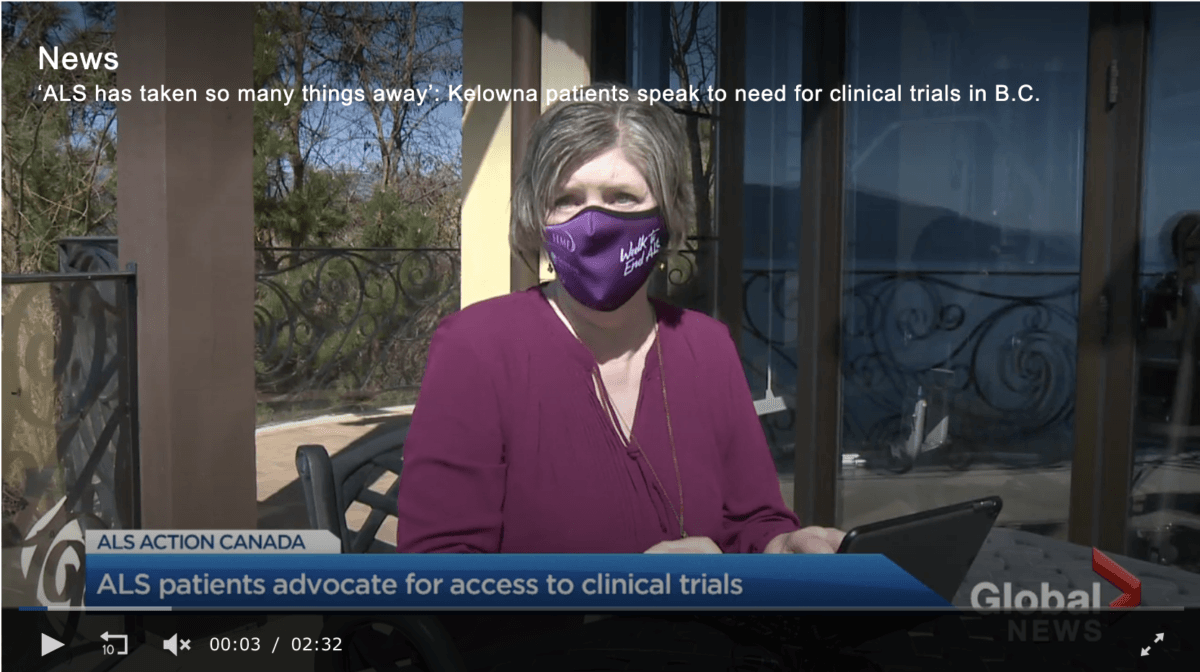
‘ALS has taken so many things away’: Kelowna patients speak to need for clinical trials in B.C.
Published in Global News April 21, 2021, written by Shelby Thom
Two ALS patients – both Kelowna residents– are speaking out, advocating for access to clinical trials in B.C. that might give them hope for a better quality of life. British Columbians diagnosed with ALS must travel – at their own expense – to other provinces and countries to take part in clinical trials. As Shelby Thom reports– with dozens of promising therapies on the horizon and the Project Hope initiative– they say there’s never been a more promising time to push the science forward.
Sara McDonald of Kelowna, B.C., is determined to still use her voice, even though she’s lost it.
McDonald communicates through a computer since ALS robbed her of the ability to speak.
“ALS has taken so many things away from me. My voice, the ability to drink and eat and my independence,” she said.
The UBC Okanagan administrator, currently on medical leave, received the devastating diagnosis in January 2020.
According to ALS Action Canada, amyotrophic lateral sclerosis (ALS), also known as Lou Gehrig’s disease, is a rare neurological disease that gradually paralyzes people because the brain is no longer able to communicate with the muscles of the body.
“Losing mobility at this point has definitely become a challenge,” said Michael Montagnon, McDonald’s son-in-law.
“Losing speech and the ability to enjoy foods and even just being able to drink water — it’s the simple things that have gone first.”
Sara met Darryl Borsato, a fellow ALS patient, through ALS Action Canada, a patient-led initiative.
“It’s my legs that have been affected and it slows down my ability to walk,” Borsato said of his condition.
The 52-year-old Kelowna man was diagnosed with familial ALS four years ago, which means it’s a genetic mutation that causes his ALS. It’s been in his family for three generations, he said.
Borsato said he travelled to Montreal 16 times in just four months to participate in a Stage 1 clinical trial.
With no cure, Borsato wants to help advance the science to slow the rapid progression of the disease.
“Even if there’s no hope for us, there’s hope for the future.”
That’s why the pair are advocating for access to ALS research trials in B.C.
READ MORE: B.C. men use their experience to help future ALS patients
“Participating in clinical trials is the only source of possible treatment or cure,” McDonald said.
“We realize that our time is limited and we also realize that if we don’t stand up and take risks and take chances, they may never find a cure for ALS,” added Borsato.
ALS Action Canada is advocating for urgent access to promising therapies, more clinical trials in Canada, and increased funding for ALS research.
“Because ALS sufferers live from two to five years after diagnosis, there’s a very rapid decline in their ability to participate in trials, particularly when travelling from the west to the east,” spokesperson Rick Wilson said.
There is promising news on the horizon though.
The ALS Society of British Columbia has raised more than $5 million to create a clinical research and trial program at UBC.
“Adding a facility at UBC has many benefits, not just the ability of patients to get access to trials, but the fact that Canada would be able to run larger trials and participate on a global level,” Borsato said.
The UBC program gives hope to patients like Borsato and McDonald who, not long ago, felt hopeless.
“This is the first time we’ve seen hope for years,” he said.
Join our fight to #EndALS!
Sign up as to receive periodic email updates and join our circle of supporters!